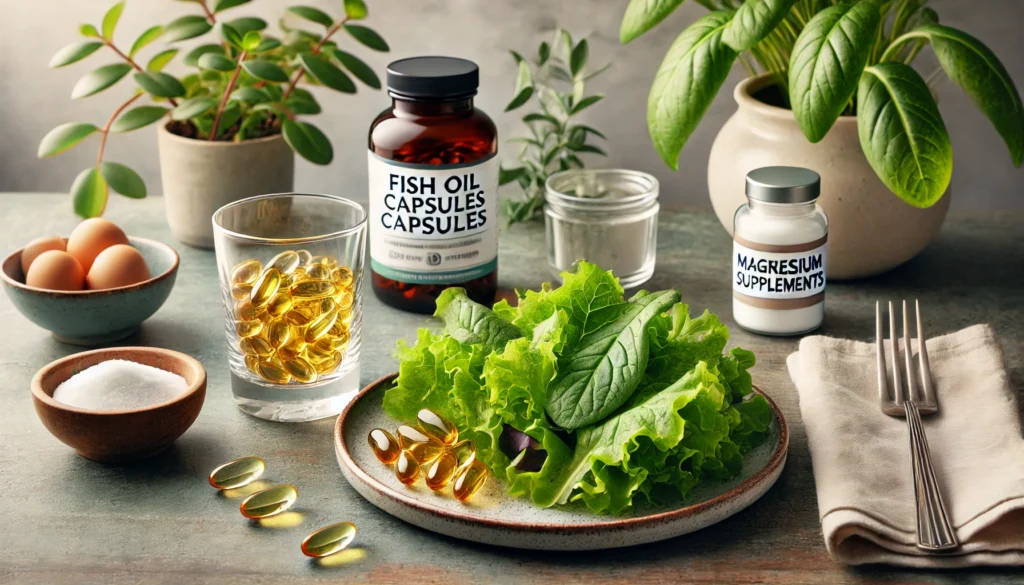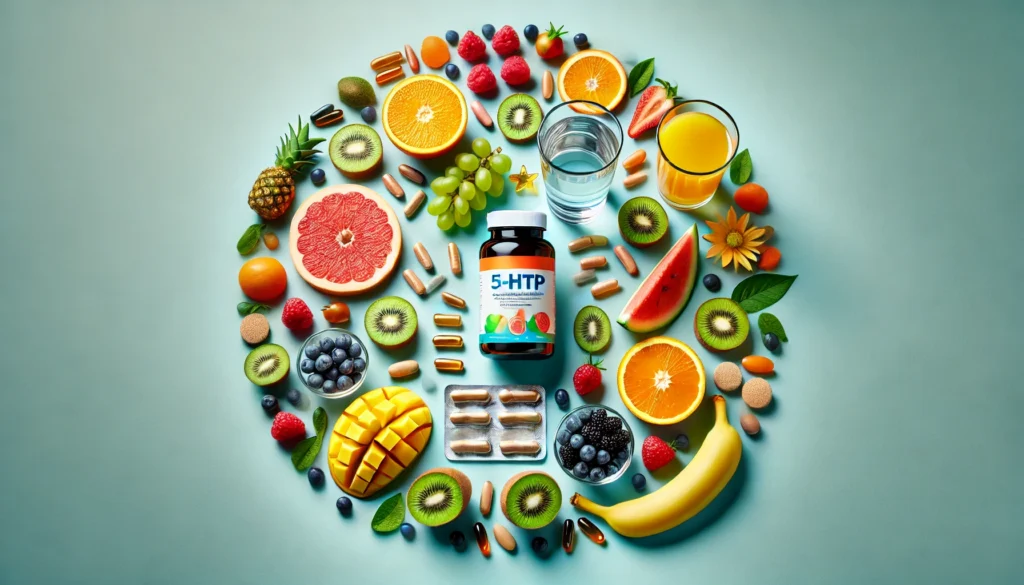Depression and anxiety are prevalent mental health challenges affecting millions worldwide. While prescription medications such as SSRIs (Selective Serotonin Reuptake Inhibitors) are commonly used, the quest for over-the-counter (OTC) alternatives is increasingly becoming a topic of interest. This article delves into the realm of OTC options, exploring their effectiveness, availability, and potential as substitutes for traditional antidepressants and anxiolytics.
Understanding Depression and Anxiety
Before we dive into OTC solutions, it’s essential to grasp the basics of depression and anxiety. These mental health disorders are characterized by persistent feelings of sadness, hopelessness, and excessive worry or fear. They can significantly impact daily life and overall well-being.
You may also like: Top Supplements to Alleviate Anxiety Naturally
The Science Behind Depression and Anxiety
At the core of these conditions is the brain’s chemistry. Neurotransmitters like serotonin, norepinephrine, and dopamine play crucial roles in mood regulation. Prescription medications often target these neurotransmitters to alleviate symptoms. However, many individuals seek OTC alternatives due to concerns about side effects, cost, or the desire for more natural approaches.
Neurotransmitter Imbalances
Depression and anxiety often stem from imbalances in neurotransmitters. Serotonin, often dubbed the “feel-good hormone,” plays a pivotal role in mood stabilization. Low levels of serotonin are linked to feelings of sadness and anxiety. Similarly, norepinephrine and dopamine are critical in regulating mood, energy, and motivation. Understanding these imbalances is crucial for exploring how OTC options might influence brain chemistry.
Psychological and Environmental Factors
While brain chemistry is vital, psychological and environmental factors also play significant roles in depression and anxiety. Stressful life events, trauma, and chronic stress can trigger or exacerbate symptoms. The interplay between these factors and neurochemistry is complex, and addressing them holistically is essential for effective treatment.
The Impact on Daily Life
Depression and anxiety are not just emotional states; they can profoundly affect daily life. From impairing work performance and relationships to diminishing overall quality of life, these conditions can be debilitating. Recognizing the wide-ranging impact of depression and anxiety underscores the importance of seeking effective treatment options, including OTC alternatives.

The Rise of Over-the-Counter Optio
The demand for OTC solutions has led to a growing market of supplements and remedies claiming to aid in managing depression and anxiety. While these are not substitutes for professional medical advice, some individuals report benefits. Let’s explore the landscape of OTC options.
Over-the-Counter Antidepressants: Myth or Reality?
When considering OTC alternatives, it’s crucial to address the question: Are there any effective over-the-counter antidepressants? The short answer is that no OTC medication can fully replace prescription antidepressants like Zoloft (sertraline) or Prozac (fluoxetine). However, several supplements and herbal remedies are believed to have mood-enhancing properties.
The Legality and Regulation of OTC Solutions
The regulation of OTC supplements differs significantly from prescription medications. In many regions, supplements are not subject to the same rigorous testing and approval processes. This lack of regulation can lead to variability in product quality and efficacy. Consumers must be vigilant in selecting reputable brands and seeking guidance from healthcare professionals.
Consumer Demand and Market Growth
The growing interest in natural and accessible treatment options has fueled the expansion of the OTC market. Consumers are increasingly drawn to products that promise mental health benefits without the need for a prescription. This trend has prompted manufacturers to develop a wide array of supplements, each claiming unique benefits for mood enhancement.
The Role of Marketing in OTC Popularity
Marketing plays a significant role in the popularity of OTC solutions. Companies often highlight the natural ingredients and potential benefits of their products, appealing to those seeking holistic approaches to mental health. However, it’s crucial for consumers to critically evaluate these claims and consider scientific evidence when choosing OTC options.
St. John’s Wort: A Popular Herbal Remedy
St. John’s Wort is one of the most researched herbal remedies for mild to moderate depression. Studies suggest it may work similarly to SSRIs by increasing serotonin levels. However, it’s important to note that St. John’s Wort can interact with other medications and isn’t suitable for everyone.
Historical Use and Modern Research
St. John’s Wort has been used for centuries in traditional medicine for its purported mood-enhancing effects. Modern research supports its use for mild to moderate depression, with some studies suggesting efficacy comparable to prescription antidepressants. However, the variability in product formulations can affect results, making standardization a key concern.
Potential Side Effects and Interactions
While generally considered safe, St. John’s Wort can cause side effects, including digestive issues, dizziness, and photosensitivity. More concerning is its potential to interact with other medications, including antidepressants, birth control pills, and blood thinners. These interactions can diminish the effectiveness of other treatments, highlighting the need for medical consultation before use.
Limitations and Considerations
Despite its popularity, St. John’s Wort is not suitable for everyone. Individuals with severe depression or those taking other medications should exercise caution. The herb’s effectiveness may vary based on the formulation and dosage, underscoring the importance of consulting with a healthcare provider to determine its appropriateness for individual needs.
Omega-3 Fatty Acids: Brain Health Boosters
Omega-3 fatty acids, commonly found in fish oil supplements, have shown promise in supporting brain health and potentially alleviating symptoms of depression. Their anti-inflammatory properties may play a role in their mood-enhancing effects.
Mechanisms of Action in Mental Health
Omega-3 fatty acids, particularly EPA and DHA, are vital components of cell membranes in the brain. They play a crucial role in maintaining cell structure and function, which is essential for neurotransmitter signaling. Their anti-inflammatory properties may also contribute to reducing depressive symptoms by combating neuroinflammation, a factor implicated in depression.
Dietary Sources and Supplementation
While Omega-3s can be obtained through diet, particularly from fatty fish like salmon and mackerel, many individuals turn to supplements to ensure adequate intake. The choice between dietary sources and supplements depends on dietary habits and preferences. Quality and purity are essential considerations when selecting supplements, as contamination with heavy metals can be a concern.
Evidence and Efficacy
Numerous studies have explored the efficacy of Omega-3 supplementation in depression, with mixed results. Some research indicates significant improvements in mood, particularly in individuals with low baseline levels of Omega-3s. However, the variability in study designs and populations underscores the need for further research to establish standardized guidelines for their use in mental health.
Over-the-Counter Options for Anxiety
Anxiety, like depression, is often managed with prescription medications. However, several OTC options claim to offer relief from anxiety symptoms.
Valerian Root: Nature’s Calming Agent
Valerian root is a popular herbal supplement known for its calming effects. It may help reduce anxiety and improve sleep quality, making it a potential choice for those seeking OTC solutions.
Mechanisms of Action and Historical Use
Valerian root has been used for centuries as a natural remedy for anxiety and insomnia. Its calming effects are attributed to compounds that interact with gamma-aminobutyric acid (GABA) receptors in the brain, promoting relaxation. Understanding these mechanisms provides insight into its potential benefits for anxiety management.
Efficacy and Research Findings
Research on valerian root’s efficacy in anxiety is mixed, with some studies demonstrating moderate benefits, particularly for sleep-related anxiety. However, results can vary based on the preparation and dosage of the supplement. Despite its popularity, more rigorous studies are needed to confirm its effectiveness and determine optimal usage guidelines.
Safety and Potential Side Effects
Valerian root is generally considered safe for short-term use, but potential side effects include dizziness, headaches, and digestive disturbances. Long-term safety data is limited, and combining valerian with other sedatives can enhance sedative effects. Individuals should approach valerian root with caution and consult healthcare providers, especially if they are taking other medications.
Magnesium: The Relaxation Mineral
Magnesium is an essential mineral involved in numerous bodily functions, including relaxation and stress reduction. Some studies suggest that magnesium supplements may help alleviate anxiety symptoms.
Physiological Role and Mechanisms
Magnesium plays a crucial role in regulating neurotransmitters that influence mood, such as serotonin and dopamine. It also modulates the stress response by interacting with the hypothalamic-pituitary-adrenal (HPA) axis. These mechanisms underscore magnesium’s potential as a natural anxiolytic.
Sources and Supplementation
Magnesium can be obtained from dietary sources such as leafy greens, nuts, and whole grains. However, many individuals choose supplements to address deficiencies or enhance mental health. When selecting supplements, consumers should consider bioavailability and potential interactions with other nutrients.
Evidence and Clinical Considerations
Clinical studies have shown promising results for magnesium supplementation in reducing anxiety symptoms, particularly in individuals with pre-existing deficiencies. However, more extensive research is needed to establish standardized dosing and long-term effects. Individuals considering magnesium supplements should consult healthcare providers to ensure safe and effective use.

Are Over-the-Counter SSRIs a Possibility?
The idea of OTC SSRIs may seem appealing, but currently, there are no SSRIs available without a prescription. SSRIs are potent medications that require careful monitoring by healthcare professionals due to potential side effects and interactions.
Serotonin Supplements: A Cautious Approach
While serotonin supplements are not available OTC, some individuals turn to 5-HTP (5-Hydroxytryptophan) supplements as a precursor to serotonin. These supplements may support serotonin production in the brain, but they should be used with caution and under medical supervision.
Understanding 5-HTP and Its Role
5-HTP is a naturally occurring amino acid that serves as a precursor to serotonin. By increasing serotonin levels, 5-HTP may help improve mood and alleviate symptoms of depression and anxiety. However, its effectiveness can vary, and the potential for interactions with other medications necessitates careful consideration.
Potential Benefits and Risks
While some studies indicate that 5-HTP supplementation can improve mood and reduce anxiety, the evidence is not conclusive. Potential risks include gastrointestinal disturbances and serotonin syndrome, a serious condition resulting from excessive serotonin levels. Individuals should weigh these risks against potential benefits and seek medical advice before use.
The Importance of Professional Guidance
Given the complexity of serotonin regulation and the potential for adverse effects, professional guidance is crucial when considering 5-HTP supplements. Healthcare providers can offer insights into appropriate dosages, potential interactions, and whether 5-HTP aligns with individual health needs.
Navigating the OTC Landscape: What You Should Know
When exploring OTC options for depression and anxiety, it’s crucial to approach them with an informed mindset. Here are some key considerations:
Consultation with a Healthcare Professional
Before starting any OTC supplement or remedy, consulting with a healthcare professional is essential. They can provide guidance on potential interactions, appropriate dosages, and whether these options align with your individual health needs.
The Role of Personalized Medicine
Personalized medicine emphasizes tailoring treatments to individual characteristics and needs. When considering OTC options, healthcare providers can assess factors such as genetic predispositions, lifestyle, and existing health conditions to recommend the most suitable supplements and dosages.
Understanding the Limitations
While OTC options may offer some relief, they are not a substitute for comprehensive mental health care. Severe or persistent symptoms of depression and anxiety should be addressed by a qualified mental health professional.
Recognizing When Professional Help is Needed
OTC solutions may provide temporary relief for mild symptoms, but they are not suitable for everyone. Recognizing the signs that professional intervention is necessary is crucial. Persistent or severe symptoms, thoughts of self-harm, or significant disruption to daily life warrant immediate attention from mental health professionals.
Integrating OTC Options with Traditional Treatments
For those already receiving professional treatment, OTC supplements can sometimes complement existing therapies. However, any changes to a treatment plan should be made in consultation with healthcare providers to avoid potential interactions and ensure a cohesive approach to mental health management.
The Importance of Lifestyle Factors
OTC options should be viewed as part of a holistic approach to mental health. Lifestyle factors such as regular exercise, a balanced diet, adequate sleep, and stress management play crucial roles in managing depression and anxiety.
Exercise and Mental Health
Regular physical activity is a powerful tool for improving mental health. Exercise stimulates the release of endorphins, which can enhance mood and reduce stress. Incorporating exercise into daily routines can complement OTC options and contribute to overall well-being.
Nutrition and Mental Wellness
A balanced diet rich in essential nutrients supports brain health and can influence mood regulation. Nutrients like B vitamins, zinc, and antioxidants play roles in neurotransmitter production and inflammation reduction. Dietary choices should be considered as part of a comprehensive mental health strategy.
Mindfulness and Stress Reduction
Mindfulness practices, such as meditation and yoga, can help manage stress and improve emotional resilience. These practices encourage present-moment awareness and relaxation, providing additional support alongside OTC options in managing anxiety and depression.

Future Implications: The Evolving Landscape of Mental Health Treatment
The quest for effective OTC solutions for depression and anxiety reflects a broader trend towards accessible and affordable mental health care. As research continues, we may see new developments in the availability and efficacy of OTC options.
Innovations in Mental Health Supplements
The supplement industry is continually evolving, with ongoing research into novel compounds and their potential benefits for mental health. Biohackers and health enthusiasts are at the forefront of exploring these innovations.
Emerging Compounds and Research Directions
Research into new compounds and their effects on mental health is expanding. Novel substances like adaptogens and nootropics are gaining attention for their potential cognitive and mood-enhancing properties. Ongoing studies aim to uncover their efficacy and safety profiles, potentially leading to new OTC offerings.
Consumer Trends and Market Dynamics
The growing interest in mental health supplements is shaping market dynamics. Consumers are increasingly seeking products that align with their values, such as sustainability and transparency. These trends are driving manufacturers to innovate and develop products that meet consumer demands while prioritizing efficacy.
The Role of Technology in Mental Health
Advancements in technology, such as mental health apps and teletherapy, are changing how individuals access mental health support. These innovations complement traditional treatments and may contribute to improved outcomes.
Digital Tools and Mental Health Support
Mental health apps and online platforms provide accessible resources for managing mental health. From guided meditation and mood tracking to virtual therapy sessions, these tools offer convenience and flexibility, empowering individuals to take charge of their mental well-being.
The Intersection of Technology and Personalized Care
Technology is enabling more personalized approaches to mental health care. Data-driven insights from wearable devices and apps can inform treatment plans, helping individuals and healthcare providers make informed decisions about OTC options and other interventions.
Conclusion
While the allure of over-the-counter solutions for depression and anxiety is strong, it’s essential to approach them with caution and informed decision-making. Consulting with healthcare professionals, understanding the limitations, and considering lifestyle factors are vital steps in managing mental health effectively.
The journey towards mental wellness is unique for each individual, and the right approach often involves a combination of treatments, including prescription medications, therapy, and lifestyle modifications. As the landscape of mental health care continues to evolve, staying informed and seeking professional guidance remains the key to achieving optimal well-being.
Further Reading:
Verywell Mind: Over-the-Counter Antidepressants
CalmClinic: Are There Any Over-The-Counter Anxiety Medications?
Mayo Clinic: Natural remedies for depression: Are they effective
Important Note: The information contained in this article is for general informational purposes only, and should not be construed as health or medical advice, nor is it intended to diagnose, prevent, treat, or cure any disease or health condition. Before embarking on any diet, fitness regimen, or program of nutritional supplementation, it is advisable to consult your healthcare professional in order to determine its safety and probable efficacy in terms of your individual state of health.
Regarding Nutritional Supplements Or Other Non-Prescription Health Products: If any nutritional supplements or other non-prescription health products are mentioned in the foregoing article, any claims or statements made about them have not been evaluated by the U.S. Food and Drug Administration, and such nutritional supplements or other health products are not intended to diagnose, treat, cure, or prevent any disease.


